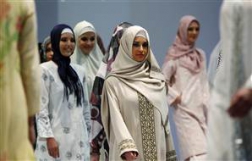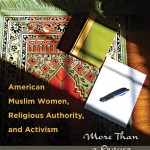Earlier this month, the Russian capital held the first Islamic Style festival. The festival was organized by the Council of Muftis in Russia and aimed to show a “correct” image of Muslim women’s clothing. The Muftis, perhaps concerned with mainstream media showing Muslim women as weak and oppressed, decided try out fashion world by encouraging Islamic fashion designers to come out and present their work.
Rushan-hazrat Abbyasov, deputy chairman of the Council of Muftis of Russia, and member of the Islamic Style festival organizing committee, was quoted as saying:
“I believe that such festivals demonstrate that a Muslim woman is updated, she can wear beautiful clothes, she is well educated. At the same time, first of all, hijab, beautiful clothes that cover the head and body of a Muslim woman, demonstrates her femininity and good temper. Thus, such festivals give opportunity to see the modernity of a Muslim woman, to see that she is not some outcast in a closed society. On the opposite, she is open; she is undoubtedly an active woman in all the spheres and problems. I believe that this festival will continue and it will be very successful.”
The coverage of the event in the Spanish-speaking media provides further information on the ideas behind the Islamic Style festival. Color ABC quotes Abbyasov as reaffirming the idea that Muslim women must be modest and cover everything except their hands, face and feet. Yet, the article highlights the beauty of the collections and the elegance of the models in the runway despite the fact that the article also mentions that some of the clothes were seen as “too tight” and the heels “too high.” Despite the fact that Islamic fashion shows may bring together a number of Muslim designers and models for the sake of offering alternatives to mainstream western clothing for Muslim women, coverage of such events, and the events themselves, perpetuate the idea that it is ok to judge Muslim women purely based on their clothing.

The Color ABC piece also aims to provide a glimpse into the fact that Russian religious authorities are trying to prove that Islam and modernity can interact with each other in a positive manner even through fashion. Terra further quotes the shows spokesperson as drawing the line between Middle Eastern Islam and Russian Islam by explaining that “in Russia we have never had a tradition of black tunics like in the Arab world. Russian Muslim women do not spend their days locked in the houses without talking to anyone.”
Going back to the Mufti, Abbyasov, he is said to believe that fashion is a “hot” topic, and perhaps he is right. In the past, MMW has covered a number of fashion-related topics, ranging from Sana’s article on Vogue magazine’s coverage of Asma Al-Assad and Sharrae’s piece on UNDERWRAPS (a modeling agency) to one of my earlier pieces on Muslim women’s involvement in the fashion industry. These days it would seem that the emergence of an Islamic fashion market demonstrates Muslim women’s agency in choosing for themselves clothing that fits their religious preferences, or their right to challenge mainstream fashion markets.
From a personal perspective, I think it is important to have involved Muslim women in the fashion industry because it may be a way to provide Muslim women with more options and because it is great to see fellow Muslim women taking leadership in affairs that interest them. Nonetheless, I am a bit skeptical about the Islamic Style festival idea. It is not the fact that religious authorities are getting involved in the fashion market, but rather the idea that a religiously organized event with Muslim women plus fashion equals modern Islam.
The event itself, judging by the looks of Abbyasov’s comments, continues to normalize the idea of hijabi vs. non hijabi woman; hijabis being the normative and non-hijabis (and even Arab niqabis, judging by the spokesperson’s comments) the outsiders. There are a few things that are problematic with this. First, the event reinforces a particular idea of what it means to be a “proper” and “pious” Muslim woman through how a woman chooses to dress. In addition, the involvement of religious authorities (mostly male) in such an event seems to speak to the need to “prove” through institutionalized religion that Muslim women are pious but fashionable, smart and modern, as opposed to generalized Western misconceptions. Lastly, this Russian event, interestingly, attempts to assert itself by drawing the line between Russian Islam and Middle Eastern Islam by deeming one more modern and adaptive than the other, and by reinforcing the idea that Middle Eastern Islam in the oppressive one.
I would be curious to see the new Modern Muslim woman emerging from Russian runways, and to look at the new challenges religion, modernity, and fashion bring…












